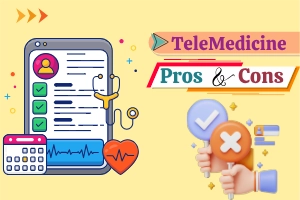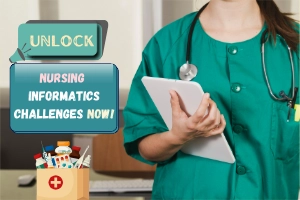Blockchain in Nursing: The Risks No One Talks About
Published: 26 Jan 2025
Blockchain is more than just a buzzword in tech circles; it can change how healthcare operates. But how exactly can it benefit nursing and patient care? In this article, we’ll break down how blockchain works, its uses in nursing, and what it means for the future of healthcare.

Whether you’re new to blockchain or exploring how it affects nursing, this article is for you!
What is Blockchain?
Blockchain is a technology that securely stores and shares data across a network of computers. It works by creating a chain of data blocks that are linked together in a secure, transparent way.
- Data Transparency: Blockchain ensures that every transaction is recorded in a secure ledger, making it nearly impossible to tamper with.
- Decentralized System: The data isn’t stored in one central place, but instead across a network of computers, improving security.
- Immutability: Once data is recorded, it can’t be changed or deleted, ensuring a secure history of information.
Blockchain in Nursing: Present and Future

Nurses can significantly impact patient care through blockchain by improving how healthcare data is shared, managed, and stored.
Optimizing Patient Data Management
- Enhanced Data Security: Blockchain allows for better management of electronic health records (EHRs). Patient data remains secure, accessible only to those with the right permissions, preventing unauthorized access.
- Better Data Portability: It allows patients to move their health records across healthcare facilities without losing important information, making treatment more efficient and personalized.
Managing Nurse Credentialing and Education
- Tracking Nurse Qualifications: Blockchain can streamline credentialing by providing a permanent, unalterable record of nurses’ certifications, continuing education, and licenses.
- Efficient Verification: It helps hospitals and healthcare providers verify nurse credentials faster, reducing paperwork and administrative delays.
Improving Nursing Research and Clinical Trials
- Secure Research Data: Blockchain ensures that research data used in nursing studies is secure and unaltered, making it more trustworthy and transparent.
- Faster Trials: By using blockchain, clinical trials can run more efficiently, with better data tracking, reducing the time and cost associated with trials.
Blockchain Applications in Nursing Practice
Blockchain isn’t just theoretical—it’s already being applied in real-world nursing practice:
- Medication Management: Blockchain can help track medication prescriptions and usage, ensuring accurate records are kept and reducing the risk of errors.
- Telehealth Integration: Blockchain supports secure, encrypted virtual consultations, keeping sensitive patient information safe while expanding access to care.
Blockchain in Nursing Education
Blockchain can also play a vital role in nursing education:
- Digital Credentials: Blockchain provides a secure way for nurses to earn and store digital certificates, showing their qualifications and continuing education achievements.
- Streamlining Education Verification: Universities and nursing programs can quickly verify the credentials of incoming students, speeding up admissions processes and reducing administrative overhead.
The Impact of Blockchain on Healthcare Systems

Healthcare systems worldwide are embracing blockchain for its potential to:
- Increase Efficiency: Blockchain reduces paperwork, speeds up transactions, and allows for real-time data sharing across healthcare institutions.
- Enhance Collaboration: By creating a unified data system, different parts of the healthcare sector can easily collaborate on patient care, leading to better outcomes.
Why Blockchain Matters in Healthcare
- Enhanced Security: Protecting patient data is more important than ever. Blockchain’s encryption ensures that health records are safe from cyberattacks and unauthorized access.
- Data Ownership: Patients can have more control over their own data, granting access to doctors and specialists as needed.
Conclusion
Blockchain technology is transforming the healthcare industry, with nursing at the heart of these changes. By improving patient data management, streamlining credentialing, and securing research, blockchain opens new doors for nursing professionals to provide better care. As technology evolves, nurses will play a crucial role in embracing these changes to enhance patient safety and care quality.
Take the first step in exploring how blockchain can impact your nursing career today and stay ahead of the curve in healthcare technology!
FAQs
Blockchain in healthcare refers to using blockchain technology to manage patient data, credentials, and records securely and efficiently.
Blockchain helps improve data management, enhance security, and streamline processes like medication tracking and patient record sharing in nursing practice.
Yes, blockchain can improve patient care by ensuring secure and transparent access to health records, reducing medical errors, and increasing efficiency in hospitals.
Blockchain allows for secure tracking of nursing credentials, certifications, and continuing education, helping streamline educational processes.
Blockchain ensures that data in clinical trials is secure, transparent, and unalterable, leading to more reliable research outcomes and faster trials.
Blockchain enhances data security, patient privacy, and access to healthcare records, improving the overall efficiency of the healthcare system.
A blockchain block in healthcare contains patient data, medical records, and transactions related to healthcare activities, ensuring secure and transparent management.
Blockchain is used in hospitals for managing patient data, verifying nurse credentials, and ensuring medication management accuracy.
Blockchain supports nursing informatics by enhancing the management of patient records, improving data integrity, and ensuring secure data sharing.
Yes, blockchain can be used in telehealth by providing secure, encrypted virtual consultations and ensuring the privacy of patient data during online interactions.

- Be Respectful
- Stay Relevant
- Stay Positive
- True Feedback
- Encourage Discussion
- Avoid Spamming
- No Fake News
- Don't Copy-Paste
- No Personal Attacks

- Be Respectful
- Stay Relevant
- Stay Positive
- True Feedback
- Encourage Discussion
- Avoid Spamming
- No Fake News
- Don't Copy-Paste
- No Personal Attacks





